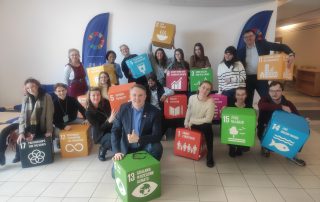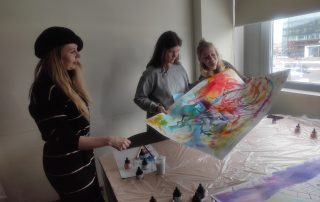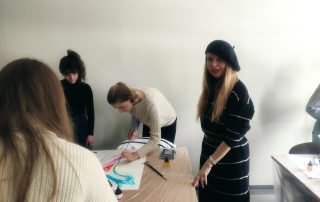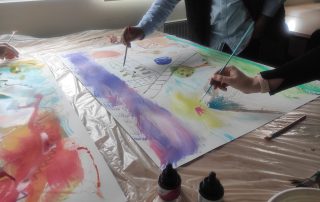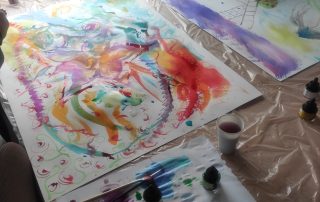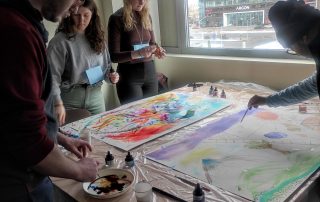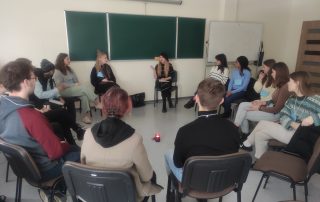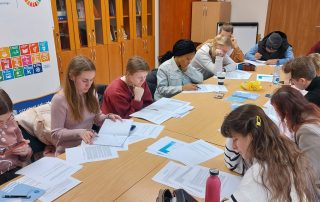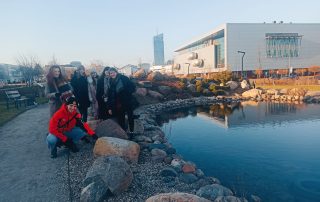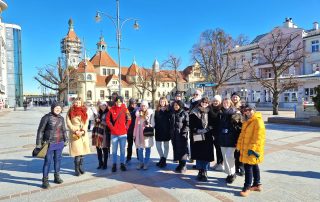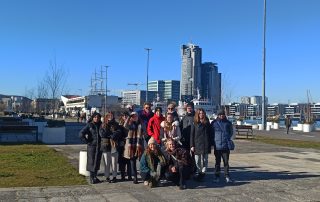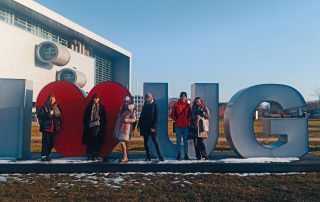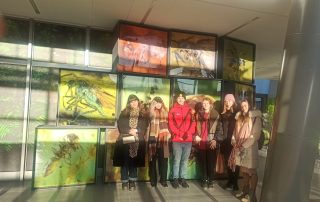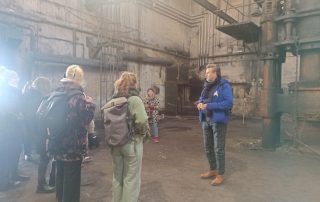Painting dialogues, excursions around the Tricity, teamwork workshops, activities – the TOWNSHIP winter school has just finished at the University of Gdansk. As part of the project, 12 students and doctoral students from Estonia, Ukraine, Germany, Turkey, the Czech Republic and Hungary came to Gdansk. The project is funded by the SPINAKER Programme – Intensive International Training Programmes of the National Agency for Academic Exchange.
The winter school ‘Sustainable urban studies – towards inclusive urbanity and sociality’ within the project “TOWNSHIP – Towards Sustainable Beautiful and Inclusive Cities: intensive international education programmes” has come to an end. Twelve participants, students and doctoral students from European universities abroad, took part from 27th February to 10th March.
“The aim of the TOWNSHIP project is to promote Gdańsk and the University of Gdańsk as a place where you can study in English. Therefore, this offer is primarily aimed at international students. The aim of the winter school was to familiarise the participants with the research topics, the staff and the campus of the University of Gdańsk” says Grażyna Chaberek, PhD, from the Faculty of Social Sciences at UG, the project manager.
The school programme was divided into two parts. In the first week there were on-site classes and in the following week there were remote classes. The workshop part took place in the Faculty of Social Sciences, at the premises of the Centre for Sustainable Development.
“As part of CZRUG’s programmes, such as ‘International Cooperation’ and ‘Education for Sustainable Development’, we are constantly involved in and support initiatives aimed at popularising the idea of sustainable development. For one week, we had the pleasure of hosting students and doctoral students within our walls as part of a winter school. They managed to form a truly international and interdisciplinary group, which eagerly engaged in workshops and discussions” says Krzysztof Szczepaniak, PhD, Director of the Centre for Sustainable Development UG.
The thematic theme of the winter school was to discuss the processes of change currently taking place in cities, which are facing the need to adapt and transform as a result of current economic, social and environmental challenges. During the course, processes of social, cultural, infrastructural, landscape and governance change were discussed through meetings with both academics and didacticians working on these topics at the University as well as with representatives of stakeholders from the external environment.
“Students have acquired the ability to characterise sustainable development goals in the context of urban areas, to identify climatic, social and economic problems of contemporary cities. They are familiar with European urban policies. In the final project, which they prepared in groups of 3-4, they proposed solutions to the problems of contemporary cities using selected locations as an example. The participants were able to practice discussion and communication in an interdisciplinary and intercultural team” emphasises Grażyna Chaberek, PhD.
The students also had the opportunity to develop their artistic sensitivity. A unique element of the winter school was the painting dialogues with Małgorzata Karczkarzyk, PhD. As the artist and researcher from the Institute of Pedagogy emphasises, the opportunity to paint the work together helps to bring communication between the participants to a higher level:
“It is a search for a different language. Verbal language is not neutral, there are certain patterns, certain rules, behaviours, while in a dialogue in painting you can do anything, there is total freedom, expression and entering a space open to exclusions, to differences. This is why painting dialogues can also be used in intercultural education” explains Małgorzata Karczmarzyk, PhD.
In addition to the classes and activities within the walls of the university, the TOWNSHIP participants also set off to explore the urban areas.
“During the two excursions, students had the opportunity to experience the Tricity directly, including learning about the landscapes, infrastructure, social and historical conditions affecting urban space. In their free time, participants also visited the UG campus in search of interesting nooks and crannies, explored the old city, and took part in a tour of the exhibition at the European Solidarity Centre” reports Weronika Kamińska, MA, from the Centre for Sustainable Development, a PhD student and supervisor of the winter school participants.
The Winter School was positively reviewed by both the international students and the University of Gdansk staff who participated in the project.
– Our participants completed the winter school very satisfied with both the content that was covered and their stay in Gdansk itself. They thus became ambassadors for our university in their respective countries. Our staff, who had the opportunity to work with this very diverse nationality group of students, also improved their competences in working with foreign students” notes Grażyna Chaberek, PhD.
The project “TOWNSHIP – Towards Sustainable Beautiful and Inclusive Cities”, headed by Grażyna Chaberek, PhD, from the Faculty of Social Sciences at UG, has received funding from the SPINAKER Programme – Intensive International Education Programmes of the National Agency for Academic Exchange.
The project will result in a total of three Intensive International Training Programmes (IMPK):
- Massive Open On-line Course: tools towards sustainable urbanity,
- Winter school: Sustainable urban studies – towards inclusive urbanity and society,
- Summer school: Sustainable urban studies – towards better urban management.
The project has been developed with the support of the UG Centre for Sustainable Development. It will be implemented by a team from the Faculty of Social Sciences, including primarily the Institute of Social and Economic Geography and Spatial Economy and the UG Centre for Sustainable Development, in collaboration with external stakeholders, including local public institutions and NGOs.



